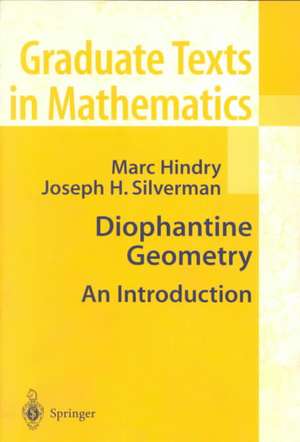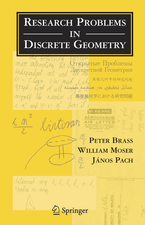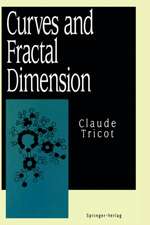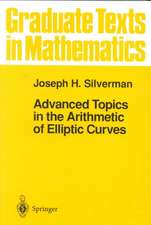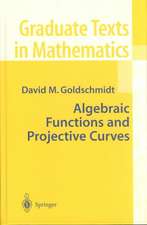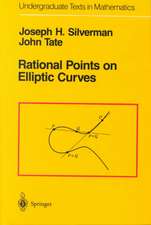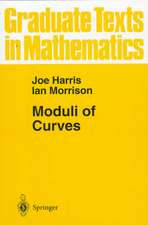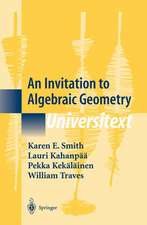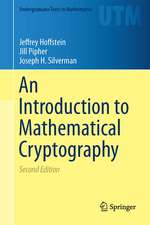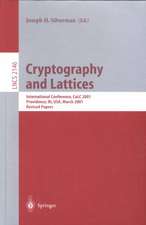Diophantine Geometry: An Introduction: Graduate Texts in Mathematics, cartea 201
Autor Marc Hindry, Joseph H. Silvermanen Limba Engleză Paperback – 22 mar 2000
| Toate formatele și edițiile | Preț | Express |
|---|---|---|
| Paperback (1) | 487.32 lei 38-44 zile | |
| Springer – 22 mar 2000 | 487.32 lei 38-44 zile | |
| Hardback (1) | 604.37 lei 6-8 săpt. | |
| Springer – 23 mar 2000 | 604.37 lei 6-8 săpt. |
Din seria Graduate Texts in Mathematics
-
 Preț: 402.89 lei
Preț: 402.89 lei - 17%
 Preț: 528.68 lei
Preț: 528.68 lei -
 Preț: 337.46 lei
Preț: 337.46 lei -
 Preț: 383.86 lei
Preț: 383.86 lei - 17%
 Preț: 366.57 lei
Preț: 366.57 lei - 17%
 Preț: 398.97 lei
Preț: 398.97 lei -
 Preț: 355.83 lei
Preț: 355.83 lei -
 Preț: 411.84 lei
Preț: 411.84 lei -
 Preț: 404.48 lei
Preț: 404.48 lei -
 Preț: 289.88 lei
Preț: 289.88 lei - 17%
 Preț: 365.80 lei
Preț: 365.80 lei - 17%
 Preț: 359.45 lei
Preț: 359.45 lei - 15%
 Preț: 488.70 lei
Preț: 488.70 lei - 13%
 Preț: 357.76 lei
Preț: 357.76 lei -
 Preț: 407.88 lei
Preț: 407.88 lei - 13%
 Preț: 352.49 lei
Preț: 352.49 lei - 13%
 Preț: 358.86 lei
Preț: 358.86 lei - 13%
 Preț: 393.48 lei
Preț: 393.48 lei - 11%
 Preț: 351.00 lei
Preț: 351.00 lei - 17%
 Preț: 359.58 lei
Preț: 359.58 lei -
 Preț: 350.46 lei
Preț: 350.46 lei - 8%
 Preț: 567.37 lei
Preț: 567.37 lei -
 Preț: 399.74 lei
Preț: 399.74 lei -
 Preț: 498.91 lei
Preț: 498.91 lei - 20%
 Preț: 571.26 lei
Preț: 571.26 lei - 15%
 Preț: 546.59 lei
Preț: 546.59 lei -
 Preț: 498.69 lei
Preț: 498.69 lei - 15%
 Preț: 354.39 lei
Preț: 354.39 lei -
 Preț: 313.11 lei
Preț: 313.11 lei - 13%
 Preț: 427.40 lei
Preț: 427.40 lei - 17%
 Preț: 363.60 lei
Preț: 363.60 lei -
 Preț: 340.19 lei
Preț: 340.19 lei - 17%
 Preț: 364.47 lei
Preț: 364.47 lei - 17%
 Preț: 366.47 lei
Preț: 366.47 lei - 17%
 Preț: 366.07 lei
Preț: 366.07 lei -
 Preț: 247.59 lei
Preț: 247.59 lei - 17%
 Preț: 367.70 lei
Preț: 367.70 lei - 13%
 Preț: 356.80 lei
Preț: 356.80 lei - 17%
 Preț: 398.78 lei
Preț: 398.78 lei - 17%
 Preț: 398.51 lei
Preț: 398.51 lei - 17%
 Preț: 496.65 lei
Preț: 496.65 lei - 13%
 Preț: 361.80 lei
Preț: 361.80 lei - 15%
 Preț: 482.97 lei
Preț: 482.97 lei -
 Preț: 402.02 lei
Preț: 402.02 lei - 17%
 Preț: 366.57 lei
Preț: 366.57 lei - 20%
 Preț: 449.74 lei
Preț: 449.74 lei -
 Preț: 380.35 lei
Preț: 380.35 lei
Preț: 487.32 lei
Nou
Puncte Express: 731
Preț estimativ în valută:
93.26€ • 97.01$ • 76.99£
93.26€ • 97.01$ • 76.99£
Carte tipărită la comandă
Livrare economică 10-16 aprilie
Preluare comenzi: 021 569.72.76
Specificații
ISBN-13: 9780387989815
ISBN-10: 0387989811
Pagini: 561
Ilustrații: 1
Dimensiuni: 155 x 235 x 27 mm
Greutate: 0.8 kg
Ediția:2000
Editura: Springer
Colecția Springer
Seria Graduate Texts in Mathematics
Locul publicării:New York, NY, United States
ISBN-10: 0387989811
Pagini: 561
Ilustrații: 1
Dimensiuni: 155 x 235 x 27 mm
Greutate: 0.8 kg
Ediția:2000
Editura: Springer
Colecția Springer
Seria Graduate Texts in Mathematics
Locul publicării:New York, NY, United States
Public țintă
GraduateDescriere
This
is
an
introduction
to
diophantine
geometry
at
the
advanced
graduate
level.
The
book
contains
a
proof
of
the
Mordell
conjecture
which
will
make
it
quite
attractive
to
graduate
students
and
professional
mathematicians.
In
each
part
of
the
book,
the
reader
will
find
numerous
exercises.
Cuprins
A
The
Geometry
of
Curves
and
Abelian
Varieties.-
A.1
Algebraic
Varieties.-
A.2
Divisors.-
A.3
Linear
Systems.-
A.4
Algebraic
Curves.-
A.5
Abelian
Varieties
over
C.-
A.6
Jacobians
over
C.-
A.7
Abelian
Varieties
over
Arbitrary
Fields.-
A.8
Jacobians
over
Arbitrary
Fields.-
A.9
Schemes.-
B
Height
Functions.-
B.1
Absolute
Values.-
B.2
Heights
on
Projective
Space.-
B.3
Heights
on
Varieties.-
B.4
Canonical
Height
Functions.-
B.5
Canonical
Heights
on
Abelian
Varieties.-
B.6
Counting
Rational
Points
on
Varieties.-
B.7
Heights
and
Polynomials.-
B.8
Local
Height
Functions.-
B.9
Canonical
Local
Heights
on
Abelian
Varieties.-
B.10
Introduction
to
Arakelov
Theory.-
Exercises.-
C
Rational
Points
on
Abelian
Varieties.-
C.1
The
Weak
Mordell—Weil
Theorem.-
C.2
The
Kernel
of
Reduction
Modulo
p.-
C.3
Appendix:
Finiteness
Theorems
in
Algebraic
Number
Theory.-
C.4
Appendix:
The
Selmer
and
Tate—Shafarevich
Groups.-
C.5
Appendix:
Galois
Cohomology
and
Homogeneous
Spaces.-
Exercises.-
D
Diophantine
Approximation
and
Integral
Points
on
Curves.-
D.1
Two
Elementary
Results
on
Diophantine
Approximation.-
D.2
Roth’s
Theorem.-
D.3
Preliminary
Results.-
D.4
Construction
of
the
Auxiliary
Polynomial.-
D.5
The
Index
Is
Large.-
D.6
The
Index
Is
Small
(Roth’s
Lemma).-
D.7
Completion
of
the
Proof
of
Roth’s
Theorem.-
D.8
Application:
The
Unit
Equation
U
+
V
=
1.-
D.9
Application:
Integer
Points
on
Curves.-
Exercises.-
E
Rational
Points
on
Curves
of
Genus
at
Least
2.-
E.I
Vojta’s
Geometric
Inequality
and
Faltings’
Theorem.-
E.2
Pinning
Down
Some
Height
Functions.-
E.3
An
Outline
of
the
Proof
of
Vojta’s
Inequality.-
E.4
An
Upper
Bound
for
h?(z,
w).-
E.5
A
Lower
Bound
for
h?(z,w)
for
Nonvanishing
Sections.-
E.6
Constructing
Sections
of
Small
Height
I:
Applying
Riemann—Roch.-
E.7
Constructing
Sections
of
Small
Height
II:
Applying
Siegel’s
Lemma.-
E.8
Lower
Bound
for
h?(z,w)
at
Admissible
Version
I.-
E.9
Eisenstein’s
Estimate
for
the
Derivatives
of
an
Algebraic
Function.-
E.10
Lower
Bound
for
h?(z,w)
at
Admissible:
Version
II.-
E.11
A
Nonvanishing
Derivative
of
Small
Order.-
E.12
Completion
of
the
Proof
of
Vojta’s
Inequality.-
Exercises.-
F
Further
Results
and
Open
Problems.-
F.1
Curves
and
Abelian
Varieties.-
F.1.1
Rational
Points
on
Subvarieties
of
Abelian
Varieties.-
F.1.2
Application
to
Points
of
Bounded
Degree
on
Curves.-
F.2
Discreteness
of
Algebraic
Points.-
F.2.1
Bogomolov’s
Conjecture.-
F.2.2
The
Height
of
a
Variety.-
F.3
Height
Bounds
and
Height
Conjectures.-
F.4
The
Search
for
Effectivity.-
F.4.1
Effective
Computation
of
the
Mordell—Weil
Group
A(k).-
F.4.2
Effective
Computation
of
Rational
Points
on
Curves.-
F.4.3
Quantitative
Bounds
for
Rational
Points.-
F.5
Geometry
Governs
Arithmetic.-
F.5.1
Kodaira
Dimension.-
F.5.2
The
Bombieri-Lang
Conjecture.-
F.5.3
Vojta’s
Conjecture.-
F.5.4
Varieties
Whose
Rational
Points
Are
Dense.-
Exercises.-
References.-
List
of
Notation.
Recenzii
"In
this
excellent
500-page
volume,
the
authors
introduce
the
reader
to
four
fundamental
finiteness
theorems
in
Diophantine
geometry.
After
reviewing
algebraic
geometry
and
the
theory
of
heights
in
Parts
A
and
B,
the
Mordell-Weil
theorem
(the
group
of
rational
points
on
an
abelian
variety
is
finitely
generated)
is
presented
in
Part
C,
Roth's
theorem
(an
algebraic
number
has
finitely
many
approximations
of
order
$2
+
\varepsilon$)
and
Siegel's
theorem
(an
affine
curve
of
genus
$g
\ge
1$
has
finitely
many
integral
points)
are
proved
in
Part
D,
and
Faltings'
theorem
(a
curve
of
genus
$g
\ge
2$
has
finitely
many
rational
points)
is
discussed
in
Part
E.
Together, Parts C--E form the core of the book and can be read by any reader already acquainted with algebraic number theory, classical (i.e., not scheme-theoretical) algebraic geometry, and the height machine. The authors write clearly and strive to help the reader understand this difficult material. They provide insightful introductions, clear motivations for theorems, and helpful outlines of complicated proofs.
This volume will not only serve as a very useful reference for the advanced reader, but it will also be an invaluable tool for students attempting to study Diophantine geometry. Indeed, such students usually face the difficult task of having to acquire a sufficient grasp of algebraic geometry to be able to use algebraic-geometric tools to study Diophantine applications. Many beginners feel overwhelmed by the geometry before they read any of the beautiful arithmetic results. To help such students, the authors have devoted about a third of the volume, Part A, to a lengthy introduction to algebraic geometry, and suggest that the reader begin by skimming Part A, possibly reading more closely any material that covers gaps in the reader's knowledge. Then Part A should be used as a reference source for geometric facts as they are needed while reading the rest of the book.
The first arithmetic portion of the book is Part B, which deals with the theory of height functions, functions which measure the "size" of a point on an algebraic variety. These objects are a key tool for the Diophantine study in Parts C--E, and the authors, in their characteristically clear and insightful style, fully prove in Part B most results on heights later used in the book.
The book concludes in Part F with a survey of further results and open problems, such as the generalization of Mordell's conjecture to higher-dimensional subvarieties of abelian varieties and questions of quantitative and effective results on the solutions of Diophantine problems.
This book is a most welcome addition to the literature. It is well written and renders accessible to students of Diophantine geometry some of the most elegant and beautiful arithmetical results of the 20th century." (Dino J. Lorenzini, Mathematical Reviews)
Together, Parts C--E form the core of the book and can be read by any reader already acquainted with algebraic number theory, classical (i.e., not scheme-theoretical) algebraic geometry, and the height machine. The authors write clearly and strive to help the reader understand this difficult material. They provide insightful introductions, clear motivations for theorems, and helpful outlines of complicated proofs.
This volume will not only serve as a very useful reference for the advanced reader, but it will also be an invaluable tool for students attempting to study Diophantine geometry. Indeed, such students usually face the difficult task of having to acquire a sufficient grasp of algebraic geometry to be able to use algebraic-geometric tools to study Diophantine applications. Many beginners feel overwhelmed by the geometry before they read any of the beautiful arithmetic results. To help such students, the authors have devoted about a third of the volume, Part A, to a lengthy introduction to algebraic geometry, and suggest that the reader begin by skimming Part A, possibly reading more closely any material that covers gaps in the reader's knowledge. Then Part A should be used as a reference source for geometric facts as they are needed while reading the rest of the book.
The first arithmetic portion of the book is Part B, which deals with the theory of height functions, functions which measure the "size" of a point on an algebraic variety. These objects are a key tool for the Diophantine study in Parts C--E, and the authors, in their characteristically clear and insightful style, fully prove in Part B most results on heights later used in the book.
The book concludes in Part F with a survey of further results and open problems, such as the generalization of Mordell's conjecture to higher-dimensional subvarieties of abelian varieties and questions of quantitative and effective results on the solutions of Diophantine problems.
This book is a most welcome addition to the literature. It is well written and renders accessible to students of Diophantine geometry some of the most elegant and beautiful arithmetical results of the 20th century." (Dino J. Lorenzini, Mathematical Reviews)
